清明清明节英语
- 格式:doc
- 大小:20.62 KB
- 文档页数:3
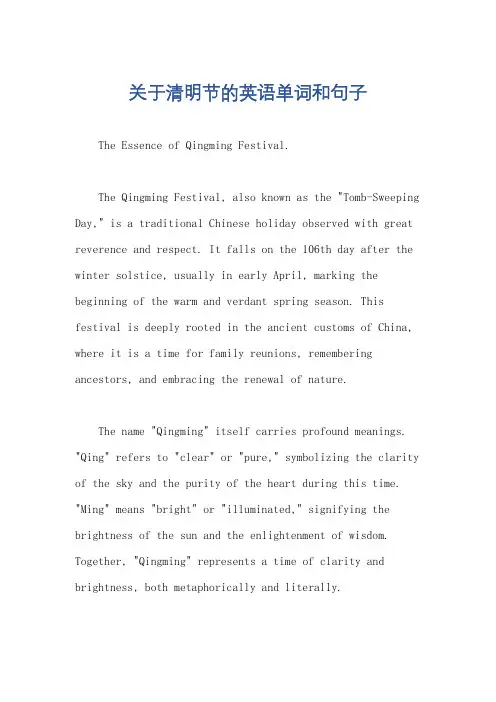
关于清明节的英语单词和句子The Essence of Qingming Festival.The Qingming Festival, also known as the "Tomb-Sweeping Day," is a traditional Chinese holiday observed with great reverence and respect. It falls on the 106th day after the winter solstice, usually in early April, marking the beginning of the warm and verdant spring season. This festival is deeply rooted in the ancient customs of China, where it is a time for family reunions, remembering ancestors, and embracing the renewal of nature.The name "Qingming" itself carries profound meanings. "Qing" refers to "clear" or "pure," symbolizing the clarity of the sky and the purity of the heart during this time. "Ming" means "bright" or "illuminated," signifying the brightness of the sun and the enlightenment of wisdom. Together, "Qingming" represents a time of clarity and brightness, both metaphorically and literally.The core practice of Qingming Festival is tomb sweeping, a ritual in which family members visit their ancestors' graves to sweep away debris, repair any damage to the tomb, and place offerings such as food, flowers, and incense.This act is not just a physical cleaning but also asymbolic gesture of respect and remembrance. It is a way of keeping the memory of the deceased alive and honoring their contributions to the family and society.The festival is also a time for outdoor activities, as the weather becomes warmer and nature is abuzz with newlife. People often go hiking, picnicking, and enjoying the beauty of the spring scenery. These activities are not just for fun but also serve as a way to appreciate the bounty of nature and to embrace the spirit of renewal and rejuvenation.Qingming Festival is also a time for literary expression. Many ancient Chinese poems and essays were written to commemorate this festival, celebrating thebeauty of spring and expressing deep emotions about lifeand death. These literary works not only captured theessence of Qingming Festival but also became a part of the cultural heritage of China.In modern times, Qingming Festival has evolved and adapted to the changing social and cultural context. While the traditional customs of tomb sweeping and outdoor activities still persist, new practices have also emerged. For instance, some people choose to plant trees or flowers in memory of their loved ones, symbolizing growth and renewal. Others engage in community service or charity work in honor of their ancestors, carrying forward their values and spirit of kindness.The significance of Qingming Festival lies not just in its customs and practices but also in its deeper cultural and philosophical implications. It is a time for reflecting on the meaning of life and death, understanding the cycles of nature and the universe, and appreciating the value of family and community. Through the practices of tomb sweeping and outdoor activities, people are reminded of their own mortality and the importance of cherishing the present moment and the relationships that matter most.In conclusion, Qingming Festival is a vibrant and meaningful holiday that celebrates the essence of life and death. It is a time for family reunions, remembering ancestors, embracing nature, and reflecting on the deeper meanings of life. As we observe this festival, we are reminded of our own connection to the past, present, and future, and the important role we play in keeping the memory and spirit of our ancestors alive.。
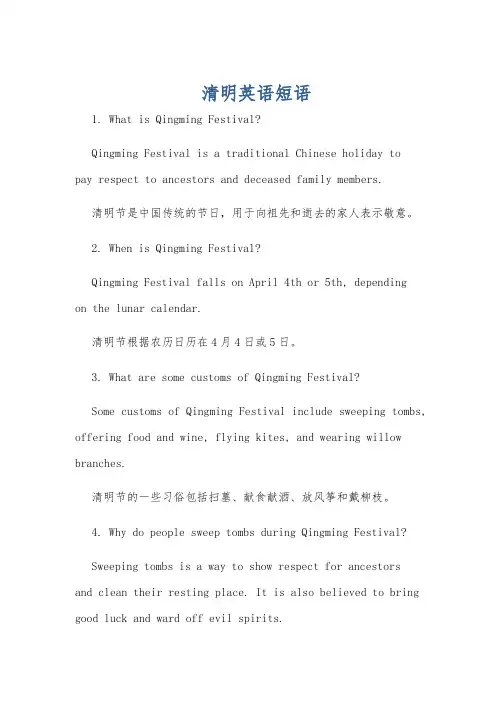
清明英语短语1. What is Qingming Festival?Qingming Festival is a traditional Chinese holiday topay respect to ancestors and deceased family members.清明节是中国传统的节日,用于向祖先和逝去的家人表示敬意。
2. When is Qingming Festival?Qingming Festival falls on April 4th or 5th, dependingon the lunar calendar.清明节根据农历日历在4月4日或5日。
3. What are some customs of Qingming Festival?Some customs of Qingming Festival include sweeping tombs, offering food and wine, flying kites, and wearing willow branches.清明节的一些习俗包括扫墓、献食献酒、放风筝和戴柳枝。
4. Why do people sweep tombs during Qingming Festival?Sweeping tombs is a way to show respect for ancestorsand clean their resting place. It is also believed to bring good luck and ward off evil spirits.扫墓是向祖先表示敬意和清洁他们的安息之所的一种方式。
人们还相信这将带来好运,并驱走恶灵。
5. What kind of food and drink do people offer during Qingming Festival?People typically offer cold dishes, such as boiled chicken and pork, and rice wine.人们通常献上凉菜,如煮鸡肉和猪肉,以及米酒。
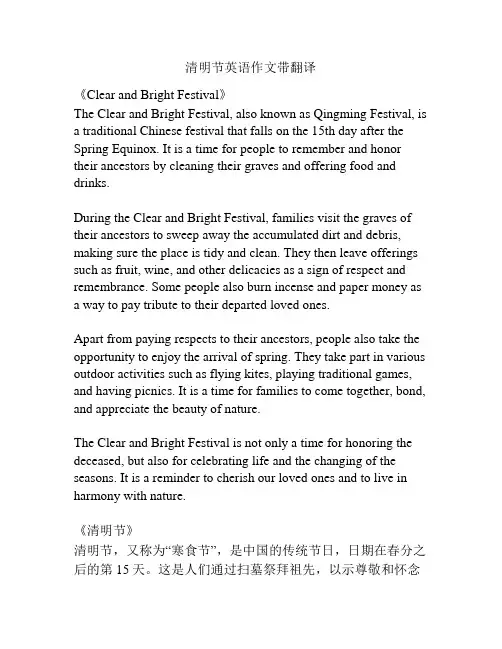
清明节英语作文带翻译《Clear and Bright Festival》The Clear and Bright Festival, also known as Qingming Festival, is a traditional Chinese festival that falls on the 15th day after the Spring Equinox. It is a time for people to remember and honor their ancestors by cleaning their graves and offering food and drinks.During the Clear and Bright Festival, families visit the graves of their ancestors to sweep away the accumulated dirt and debris, making sure the place is tidy and clean. They then leave offerings such as fruit, wine, and other delicacies as a sign of respect and remembrance. Some people also burn incense and paper money as a way to pay tribute to their departed loved ones.Apart from paying respects to their ancestors, people also take the opportunity to enjoy the arrival of spring. They take part in various outdoor activities such as flying kites, playing traditional games, and having picnics. It is a time for families to come together, bond, and appreciate the beauty of nature.The Clear and Bright Festival is not only a time for honoring the deceased, but also for celebrating life and the changing of the seasons. It is a reminder to cherish our loved ones and to live in harmony with nature.《清明节》清明节,又称为“寒食节”,是中国的传统节日,日期在春分之后的第15天。
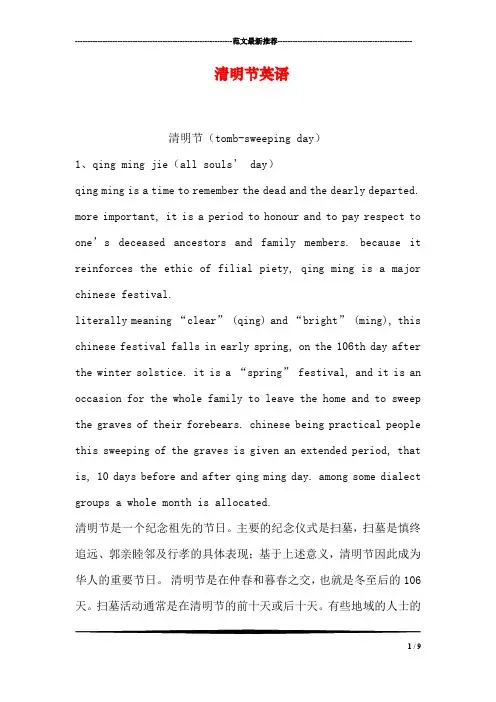
---------------------------------------------------------------范文最新推荐------------------------------------------------------清明节英语清明节(tomb-sweeping day)1、qing ming jie(all souls’ day)qing ming is a time to remember the dead and the dearly departed. more important, it is a period to honour and to pay respect to one’s deceased ancestors and family member s. because it reinforces the ethic of filial piety, qing ming is a major chinese festival.literally meaning “clear” (qing) and “bright” (ming), this chinese festival falls in early spring, on the 106th day after the winter solstice. it is a “spring” fes tival, and it is an occasion for the whole family to leave the home and to sweep the graves of their forebears. chinese being practical people this sweeping of the graves is given an extended period, that is, 10 days before and after qing ming day. among some dialect groups a whole month is allocated.清明节是一个纪念祖先的节日。
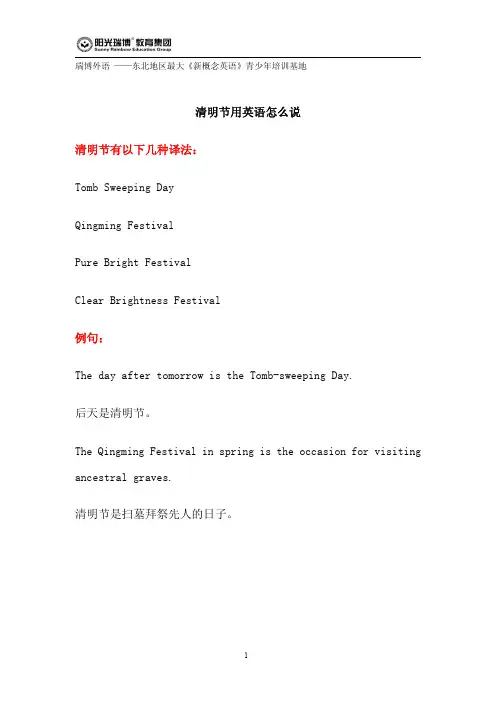
瑞博外语——东北地区最大《新概念英语》青少年培训基地清明节用英语怎么说清明节有以下几种译法:Tomb Sweeping DayQingming FestivalPure Bright FestivalClear Brightness Festival例句:The day after tomorrow is the Tomb-sweeping Day.后天是清明节。
The Qingming Festival in spring is the occasion for visiting ancestral graves.清明节是扫墓拜祭先人的日子。
清明节(Tomb-Sweeping Day)Qing Ming Jie(Tomb-Sweeping Day)Qing Ming is a time to remember the dead and the dearly departed.More important,it is a period to honour and to pay respect to one's deceased an cestors and family members.Because it reinforces the ethic of filial piety, Qing Ming is a major Chinese festival.Literally meaning"clear"(Qing)and"bright"(Ming),this Chinese festiva l falls in early spring,on the106th day after the winter solstice.It is a"sp ring"festival,and it is an occasion for the whole family to leave the home and to sweep the graves of their forebears.Chinese being practical peopl e this sweeping of the graves is given an extended period,that is,10days before and after Qing Ming day.Among some dialect groups a whole mo nth is allocated.清明节是一个纪念祖先的节日。
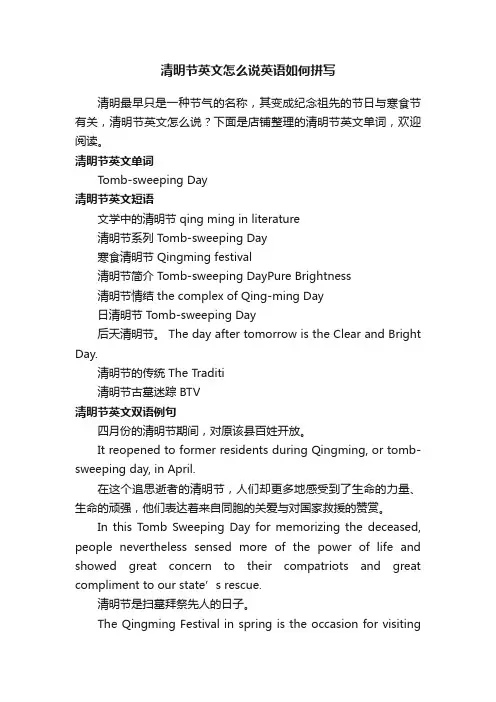
清明节英文怎么说英语如何拼写清明最早只是一种节气的名称,其变成纪念祖先的节日与寒食节有关,清明节英文怎么说?下面是店铺整理的清明节英文单词,欢迎阅读。
清明节英文单词Tomb-sweeping Day清明节英文短语文学中的清明节 qing ming in literature清明节系列 T omb-sweeping Day寒食清明节 Qingming festival清明节简介 T omb-sweeping DayPure Brightness清明节情结 the complex of Qing-ming Day日清明节 Tomb-sweeping Day后天清明节。
The day after tomorrow is the Clear and Bright Day.清明节的传统 The Traditi清明节古墓迷踪 BTV清明节英文双语例句四月份的清明节期间,对原该县百姓开放。
It reopened to former residents during Qingming, or tomb-sweeping day, in April.在这个追思逝者的清明节,人们却更多地感受到了生命的力量、生命的顽强,他们表达着来自同胞的关爱与对国家救援的赞赏。
In this Tomb Sweeping Day for memorizing the deceased, people nevertheless sensed more of the power of life and showed great concern to their compatriots and great compliment to our state’s rescue.清明节是扫墓拜祭先人的日子。
The Qingming Festival in spring is the occasion for visitingancestral graves.据中国传统习俗,人们通常在清明节放风筝。
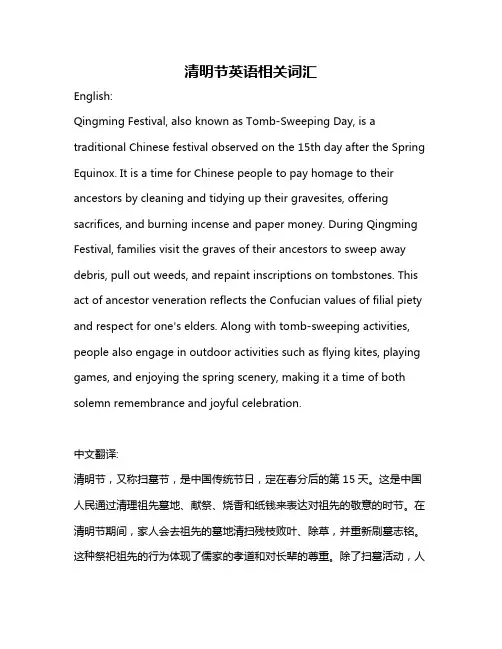
清明节英语相关词汇English:Qingming Festival, also known as Tomb-Sweeping Day, is a traditional Chinese festival observed on the 15th day after the Spring Equinox. It is a time for Chinese people to pay homage to their ancestors by cleaning and tidying up their gravesites, offering sacrifices, and burning incense and paper money. During Qingming Festival, families visit the graves of their ancestors to sweep away debris, pull out weeds, and repaint inscriptions on tombstones. This act of ancestor veneration reflects the Confucian values of filial piety and respect for one's elders. Along with tomb-sweeping activities, people also engage in outdoor activities such as flying kites, playing games, and enjoying the spring scenery, making it a time of both solemn remembrance and joyful celebration.中文翻译:清明节,又称扫墓节,是中国传统节日,定在春分后的第15天。
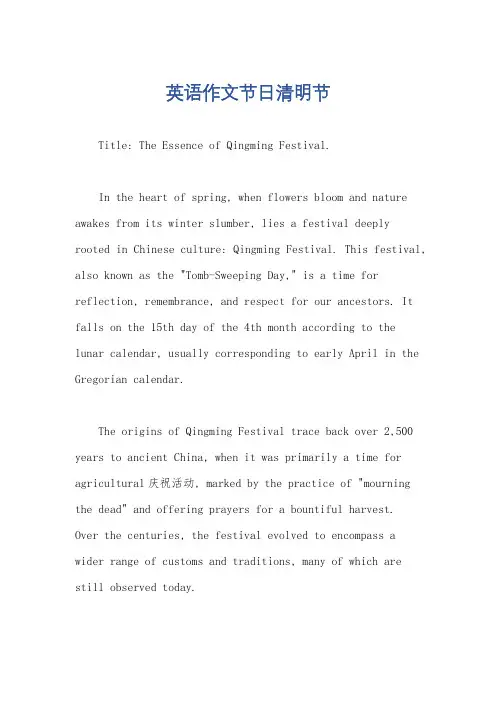
英语作文节日清明节Title: The Essence of Qingming Festival.In the heart of spring, when flowers bloom and nature awakes from its winter slumber, lies a festival deeply rooted in Chinese culture: Qingming Festival. This festival, also known as the "Tomb-Sweeping Day," is a time for reflection, remembrance, and respect for our ancestors. It falls on the 15th day of the 4th month according to thelunar calendar, usually corresponding to early April in the Gregorian calendar.The origins of Qingming Festival trace back over 2,500 years to ancient China, when it was primarily a time for agricultural庆祝活动, marked by the practice of "mourning the dead" and offering prayers for a bountiful harvest.Over the centuries, the festival evolved to encompass a wider range of customs and traditions, many of which arestill observed today.One of the most significant customs associated with Qingming Festival is tomb sweeping. This involves family members visiting their ancestors' graves to clean and tidy up the area, removing any accumulated dirt or debris. They often bring offerings of food, flowers, and incense, burning paper money as a symbolic gesture of providing for their ancestors in the afterlife. This practice is a powerful expression of filial piety, the deep respect and love for one's parents and ancestors that is central to Confucian ethics.Alongside tomb sweeping, Qingming Festival is also marked by outings into nature, a custom known as "spring outing" or "hiking the graves." These activities serve as a welcome break from the winter months, allowing families to enjoy the beauty of blooming flowers, new growth, and the fresh air of spring. It is believed that taking a walk in nature on this day can help purge negative energy and promote positive vibes, a concept known as "sweeping away bad luck."In addition to these traditional practices, QingmingFestival is also a time for cultural expression. Many local communities organize events such as dragon dance performances, martial arts demonstrations, and traditional music concerts. These activities not only celebrate the festival but also preserve and promote the rich cultural heritage of China.The festival's significance extends beyond mere customs and traditions, however. Qingming Festival is a powerful reminder of our connection to our ancestors and the importance of maintaining a sense of continuity with our past. It teaches us the value of respect and gratitude, not only for those who have come before us but also for the natural world that sustains us.In modern society, where the pace of life is often fast and the ties to our ancestors may seem increasingly distant, Qingming Festival serves as a timely reminder of our roots. It encourages us to pause, reflect, and give thanks for all that we have inherited from our forebears, including therich cultural legacy that defines us as Chinese.In conclusion, Qingming Festival is much more than just a day on the calendar. It is a celebration of life, a time for remembering and honoring our ancestors, and a momentfor renewal and rejuvenation in the embrace of spring. As we continue to observe this festival year after year, we are reminded of the enduring power of tradition and the importance of keeping our cultural identity alive.。
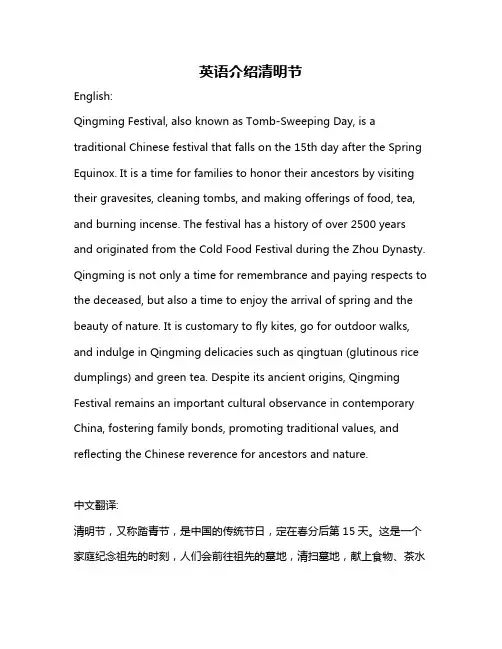
英语介绍清明节English:Qingming Festival, also known as Tomb-Sweeping Day, is a traditional Chinese festival that falls on the 15th day after the Spring Equinox. It is a time for families to honor their ancestors by visiting their gravesites, cleaning tombs, and making offerings of food, tea, and burning incense. The festival has a history of over 2500 years and originated from the Cold Food Festival during the Zhou Dynasty. Qingming is not only a time for remembrance and paying respects to the deceased, but also a time to enjoy the arrival of spring and the beauty of nature. It is customary to fly kites, go for outdoor walks, and indulge in Qingming delicacies such as qingtuan (glutinous rice dumplings) and green tea. Despite its ancient origins, Qingming Festival remains an important cultural observance in contemporary China, fostering family bonds, promoting traditional values, and reflecting the Chinese reverence for ancestors and nature.中文翻译:清明节,又称踏青节,是中国的传统节日,定在春分后第15天。
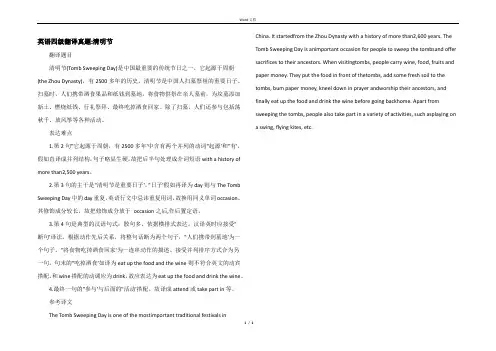
Word 文档1 / 1英语四级翻译真题:清明节翻译题目清明节(Tomb Sweeping Day)是中国最重要的传统节日之一。
它起源于周朝(the Zhou Dynasty),有2500多年的历史。
清明节是中国人扫墓祭祖的重要日子。
扫墓时,人们携带酒食果品和纸钱到墓地,将食物供祭在亲人墓前,为坟墓添加新土、燃烧纸钱、行礼祭拜、最终吃掉酒食回家。
除了扫墓,人们还参与包括荡秋千、放风筝等各种活动。
表达难点1.第2句"它起源于周朝,有2500多年'中含有两个并列的动词"起源'和"有',假如直译成并列结构,句子略显生硬,故把后半句处理成介词短语with a history of more than2,500 years 。
2.第3句的主干是"清明节是重要日子',"日子'假如再译为day 则与The Tomb Sweeping Day 中的day 重复,英语行文中忌讳重复用词,故换用同义单词occasion 。
其修饰成分较长,故把修饰成分放于 occasion 之后,作后置定语。
3.第4句是典型的汉语句式:散句多、依据横排式表达。
汉译英时应接受"断句'译法。
根据动作先后关系,将整句话断为两个句子,"人们携带到墓地'为一个句子。
"将食物吃掉酒食回家'为一连串动作的描述。
接受并列排序方式合为另一句。
句末的"吃掉酒食'如译为eat up the food and the wine 则不符合英文的动宾搭配。
和wine 搭配的动调应为drink ,故应表达为eat up the food and drink the wine 。
4.最终一句的"参与'与后面的"活动'搭配。
故译成attend 或take part in 等。
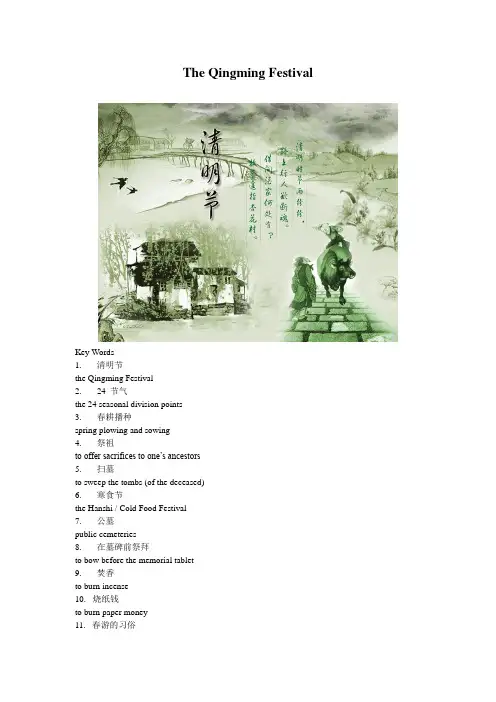
The Qingming FestivalKey Words1. 清明节the Qingming Festival2. 24 节气the 24 seasonal division points3. 春耕播种spring plowing and sowing4. 祭祖to offer sacrifices to one’s ancestors5. 扫墓to sweep the tombs (of the deceased)6. 寒食节the Hanshi / Cold Food Festival7. 公墓public cemeteries8. 在墓碑前祭拜to bow before the memorial tablet9. 焚香to burn incense10. 烧纸钱to burn paper money11. 春游的习俗the custom of Spring outings12. 放风筝to fly kites (kite flying)13. 一串小灯笼a string of little lanterns14. 植树,树苗to plan trees, saplings15. 植树节the Arbor Day16. 秋千a swing17. 踏青stepping the green18. 孝顺(to practice) filial piety19. 健身body-building20. 拔河tug of war21. 斗鸡rooster-fightingThe Qingming FestivalThe Qingming Festival is one of the 24 seasonal division points in China, falling on April 4-6 each year. After the festival, the temperature will rise up and rainfall increases. It is the high time for spring plowing and sowing. But the Qingming Festival is not only a seasonal point to guide farm work; it is more a festival of commemoration.The Qingming Festival sees a combination of sadness and happiness.This is the most important day of sacrifice. Both the Han and minority ethnic groups at this time offer sacrifices to their ancestors and sweep the tombs of the deceased. Also, they will not cook on this day and only cold food is served.The Hanshi (Cold Food) Festival was usually one day before the Qingming Festival. As our ancestors often extended the day to the Qingming, they were later combined.On each Qingming Festival, all cemeteries are crowded with people who came to sweep tombs and offer sacrifices. Traffic on the way to the cemeteries becomes extremely jammed. The customs have been greatly simplified today. After slightly sweeping the tombs, people offer food, flowers and favorites of the dead, then burn incense and paper money and bow before the memorial tablet.In contrast to the sadness of the tomb sweepers, people also enjoy hope of Spring on this day. The Qingming Festival is a time when the sun shines brightly, the trees and grass become green and nature is again lively. Since ancient times, people have followed the custom of Spring outings. At this time tourists are everywhere.People love to fly kites during the Qingming Festival. Kite flying is actually not limited to the Qingming Festival. Its uniqueness lies in that people fly kites not during the day, but also at night. A string of little lanterns tied onto the kite or the thread look like shining stars, and therefore, are called "god's lanterns."The Qingming Festival is also a time to plant trees, for the survival rate of saplings is high and trees grow fast later. In the past, the Qingming Festival was called "Arbor Day". But since 1979, "Arbor Day" was settled as March 12 according to the Gregorian calendar.Qingming Festival ActivitiesSwingSwing is a kind of game utensils. Swinging is a sport that the player swings back and forth with a tread plate hung on a frame by long ropes.The origin of swing can be traced back to some 100,000 years ago. Climbing trees or crossing streams is the most primitive embryonic form of swinging. Later in the Spring and Autumn Period (770 BC to 476 years ago), the swing consisting of a tread plated hung on the frame by ropes was introduced into the Central Plains area. Since the Han dynasty (206 BC to 220 AD), swinging had gradually became a folk activity performed at the Tomb Sweeping Festival, the Dragon Boat Festival and other festivals until present day. Swinging can be categorized into the single swing, double swing, standing swing and sitting swing. Each village has its own master swinging player and sometimes competitions are held. The one swinging highest with the most beautiful movements will receive praise from neighbors. Swinging days are often good opportunities for young men and women to encounter and interact. Swing, as the folk traditional sport with a history of several thousand years still maintains its vitality nowadays.Kite-flyingThe custom of kite-flying prevails during the Tomb Sweeping Day (around April 5th).The bamboo crossbow of the kite vibrates with a buzz as it rises aloft on the power of its tail.Big kites can be as broad as about three metres square with a tail of six to ten metres. Most kites have a rectangular shape. The rest are patterned as crabs, centipedes, butterflies and dragonflies, or Chinese characters such as "fortune" or "longevity". All kites are constructed with fine craftsmanship.When flown in the evening, they have lights attached to their tails and some have as many as three to five lights strung together.Stepping-the-green"Stepping-the-green" refers to the spring-outgoing people talk about now. Qingming is in early March when it begins to turn warm, and everything is blooming. So it is just a good time to go out for a walk. And so Qingming is not just a blue time for remembrance, but also a green time for fun.T omb-sweepingTomb-sweeping is the main observance of the Qingming Festival. Tomb-sweeping is the concrete expression of practicing filial piety, which has been emphasizing by the Chinese people since ancient times. Therefore, the Qingming Festival has been an important day for the Chinese since early times. Tomb-sweeping activities are usually done two days before Qingming or the ten days after. On the day of tomb sweeping, the descendants would clear the wild grass around the ancestor's tomb, clean the dust, and then present the food and fresh flowers.Tomb Sweeping Day, also called "Cold Food Day", is the most important day for people to offer sacrifice to ancestors. It started from the Zhou Dynasty, with a history of over 2500 years. Qingming is one of the 24 solar terms in China, indicating the coming of late spring, thus the best plowing and growing time, while "Cold Food Day" is a day when folks sweep the ancestors' tombs and eat cold food. Qingming was adjacent to Cold Food Day, so later on they gradually became one festival, and thus "Cold Food" became another name for Qingming, and dusting the tomb and eating cold food turned into the customs of Qing Ming. Qing Ming has evolved into a culture-rich and meaning-deep remembrance day.Since people with weak constitutions might get hurt by eating cold raw food on Qingming, when the weather is still cold, various activities were invented for body-building, like stepping-the-green outgoing, swing, Chinese football (蹴鞠cù jū), polo, willow-planting, tug-of-war, and rooster-fighting, etc.明是我国的二十四节气之一。
英语作文,清明节Qingming Festival, also known as Tomb-Sweeping Day, is a traditional Chinese festival that falls on the 15th day after the Spring Equinox. It's a time for people to remember and honor their ancestors by visiting their graves, cleaning tombstones, and making offerings of food and other items.During Qingming Festival, families gather at the gravesites of their ancestors to pay their respects. They sweep the tombs, offer food, burn incense, and light firecrackers as a way to show filial piety and respect for the deceased. It's also a time for families to come together, bond, and cherish the memories of their loved ones.In modern times, Qingming Festival has evolved into a time not only for ancestral worship but also for people to enjoy the outdoors, fly kites, and appreciate the beauty of nature as spring blooms. It serves as a reminder of the importance of family, tradition, and the cycle of life.中文翻译:清明节,又称为扫墓节,是中国的传统节日,日期在春分后第15天。
清明节英语小短文5句自带翻译清明节是中国的传统节日,通常在每年的4月4日至6日之间举行。
它是一个重要的节日,人们在这一天会去祭拜祖先并悼念逝去的亲人。
下面是关于清明节的五句英文句子,并附有翻译。
1.清明节是中国传统节日之一,也是春天的开始。
–Translation: Qingming Festival is one of the traditional Chinese festivals and marks the beginning of spring.在这一天,人们会去扫墓,烧纸钱,并且带上鲜花和食物。
2.On Qingming Festival, people visit the graves of their ancestors, burnpaper money, and bring along flowers and food.–Translation: 在清明节这一天,人们会去祭拜祖先的墓地,烧纸钱,并带上鲜花和食物。
他们会清理墓地,祭拜祖先,还有一些人会在墓地旁边野餐。
3.They clean the tombstones, worship their ancestors, and some peoplehave picnics near the graves.–Translation: 他们会清洁墓碑,祭拜祖先,而有些人则在墓地附近野餐。
清明节还有一个传统的活动是放风筝,这象征着人们向天空传递心灵的快乐和吉祥。
4.Another traditional activity during Qingming Festival is flying kites,which symbolizes people sending joy and auspiciousness to the sky.–Translation: 清明节期间的另一项传统活动是放风筝,这象征着人们向天空传递快乐和吉祥的心灵。
★英语资源频道为⼤家整理的清明节英⽂怎么说附翻译。
清明的意思是清淡明智。
“清明”是夏历⼆⼗四节⽓之⼀,中国⼴⼤地区有在清明之⽇进⾏祭祖、扫墓、踏青的习俗,逐渐演变为华⼈以扫墓、祭拜等形式纪念祖先的⼀个中国传统节⽇。
更多阅读请查看本站频道。
Qing Ming Jie(All Souls' Day) Qing Ming is a time to remember the dead and the dearly departed. More important, it is a period to honour and to pay respect to one's deceased ancestors and family members. Because it reinforces the ethic of filial piety, Qing Ming is a major Chinese festival. Literally meaning "clear" (Qing) and "bright" (Ming), this Chinese festival falls in early spring, on the 106th day after the winter solstice. It is a "spring" festival, and it is an occasion for the whole family to leave the home and to sweep the graves of their forebears. Chinese being practical people this sweeping of the graves is given an extended period, that is, 10 days before and after Qing Ming day. Among some dialect groups a whole month is allocated.清明节是⼀个纪念祖先的节⽇。
清明节英语词汇大全English:Qingming Festival, also known as Tomb-Sweeping Day, is a traditional Chinese festival that falls on the 15th day after the Spring Equinox. It is a time for people to honor and remember their ancestors by visiting their graves, cleaning the burial sites, offering food and burning incense. The festival is also an opportunity for families to get together and enjoy outdoor activities such as flying kites and having a picnic. In addition to tomb-sweeping, the Qingming Festival is also a time for people to appreciate the arrival of spring and indulge in other cultural activities such as drinking Qingming tea and wearing willow branches on their heads.中文翻译:清明节,又称为踏青节,是中国的一个传统节日,定在春分后的第15天。
这是一个人们纪念祖先的时间,他们会去祖坟上祭拜,清理墓地,献食和焚香。
这个节日也是家人团聚的时刻,人们可以一起享受户外活动,比如放风筝和野餐。
除了扫墓,清明节也是人们欣赏春天的时候,可以一起参加其他文化活动,比如品尝清明茶和戴上柳枝。
英语资源频道为⼤家整理的清明节英⽂怎么说及⼏种译法,供⼤家参考:)清明节有以下⼏中译法: Tomb Sweeping Day Qingming Festival Pure Bright Festival Clear Brightness Festival 例句: The day after tomorrow is the Tomb-sweeping Day. 后天是清明节。
The Qingming Festival in spring is the occasion for visiting ancestral graves. 清明节是扫墓拜祭先⼈的⽇⼦。
The Qingming Festival is a statutory public holiday in mainland China. 清明节在中国⼤陆地区是法定节假⽇。
清明节(Tomb-Sweeping Day,All Souls' Day) Qing Ming Jie(All Souls' Day) Qing Ming is a time to remember the dead and the dearly departed. More important, it is a period to honour and to pay respect to one's deceased ancestors and family members. Because it reinforces the ethic of filial piety, Qing Ming is a major Chinese festival. Literally meaning "clear" (Qing) and "bright" (Ming), this Chinese festival falls in early spring, on the 106th day after the winter solstice. It is a "spring" festival, and it is an occasion for the whole family to leave the home and to sweep the graves of their forebears. Chinese being practical people this sweeping of the graves is given an extended period, that is, 10 days before and after Qing Ming day. Among some dialect groups a whole month is allocated. 清明节是⼀个纪念祖先的节⽇。
★⽆忧考英语资源频道为⼤家整理的清明节英语双语翻译。
清明的意思是清淡明智。
“清明”是夏历⼆⼗四节⽓之⼀,中国⼴⼤地区有在清明之⽇进⾏祭祖、扫墓、踏青的习俗,逐渐演变为华⼈以扫墓、祭拜等形式纪念祖先的⼀个中国传统节⽇。
更多阅读请查看本站频道。
Qing Ming Jie(All Souls" Day) Qing Ming is a time to remember the dead and the dearly departed. More important, it is a period to honour and to pay respect to one's deceased ancestors and family members. Because it reinforces the ethic of filial piety, Qing Ming is a major Chinese festival. Literally meaning "clear" (Qing) and "bright" (Ming), this Chinese festival falls in early spring, on the 106th day after the winter solstice. It is a "spring" festival, and it is an occasion for the whole family to leave the home and to sweep the graves of their forebears. Chinese being practical people this sweeping of the graves is given an extended period, that is, 10 days before and after Qing Ming day. Among some dialect groups a whole month is allocated. 清明节是⼀个纪念祖先的节⽇。
三一文库()/节日庆典/清明
清明节英语
清明节(tomb-sweepingday)
1、qingmingjie(allsouls'day)
qingmingisatimetorememberthedeadandthedearlydeparted.morei mportant,itisaperiodtohonourandtopayrespecttoone'sdeceasedanc estorsandfamilymembers.becauseitreinforcestheethicoffilialpiety,qi ngmingisamajorchinesefestival.
literallymeaning"clear"(qing)and"bright"(ming),thischinesefestivalfa llsinearlyspring,onthe106thdayafterthewintersolstice.itisa"spring"fe stival,anditisanoccasionforthewholefamilytoleavethehomeandtosw eepthegravesoftheirforebears.chinesebeingpracticalpeoplethisswee pingofthegravesisgivenanextendedperiod,thatis,10daysbeforeandaf terqingmingday.amongsomedialectgroupsawholemonthisallocated.
清明节是一个纪念祖先的节日。
主要的纪念仪式是扫墓,扫墓是慎终追远、郭亲睦邻及行孝的具体表现;基于上述意义,清明节因此成为华人的重要节日。
清明节是在仲春和暮春之交,也就是冬至后的106天。
扫墓活动通常是在清明节的前十天或后十天。
有些地域的人士的扫墓活动长达一个月。
origin(起源)
qingmingispopularlyassociatedwithjiezizhui,wholivedinshanxiprovin cein600b.c.legendhasitthatjiesavedhisstarvinglord'slifebyservingapi eceofhisownleg.whenthelordsucceededinbecomingtherulerofasmall principality,heinvitedhisfaithfulfollowertojoinhim.however,jiedeclin edhisinvitation,preferringtoleadahermit'slifewithhismotherinthemo untains.
believingthathecouldforcejieoutbyburningthemountain,thelordorde redhismentosettheforestonfire.tohisconsternation,jiechosetoremai nwherehewasandwasburnttodeath.tocommemoratejie,thelordorde redallfiresineveryhometobeputoutontheanniversaryofjie'sdeath.thu sbeganthe"coldfoodfeast",adaywhennofoodcouldbecookedsincenof irecouldbelit.。